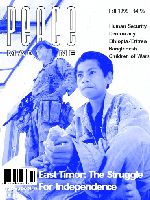
Peace Magazine Fall 1999, page 5. Some rights reserved.
Search for other articles by various here
The so-called "ethical foreign policy" now proclaimed by Canada and other NATO countries includes "humane deterrence," designed to limit the number of asylum seekers arriving. Using visa requirements, carrier liability, deportation, repatriation and removal to "safe third countries," the victims of conflicts who do not meet the very narrow definition laid down in the U.N. Convention on Refugees are denied the long-term protection they need. The Convention itself was a "Cold War" instrument, designed to respond to defectors from Communist countries. It is not an appropriate measure by which to deal with current global crises.
Some refugee flows may be seen as threats to international security, thereby invoking intervention by the U.N. Security Council or NATO, but the preferred response is to contain the outflow of refugees, set up camps for temporary protection, encourage repatriation, and to talk vaguely about addressing "root causes." Such an agenda fails to recognize the direct culpability of developed countries in exploiting the human and material resources of developing countries and, above all, turns a blind eye to the global "arms bazaar," and the growing use of mercenary forces to protect the interests of transnational corporations in civil conflicts.
An ethical foreign policy seriously devoted to the promotion of human welfare and security would not continue to bomb Iraq, side with the KLA in Kosovo, or promote the sale of arms to states with dubious human rights records. (Although Canada may not have supplied military equipment to Indonesia in recent years, other NATO countries have. Britain delivered Hawk jets just hours before the E.U. declared its ban on 13 September, and after the U.N. decided to send peacekeepers.)
Anthony H. Richmond
Professor Emeritus,
York University, Toronto
I am still in prison after 12.5 years (11.5 in solitary) yet nuclear weapons in Israel still exist and in secret, despite my revelation. I wanted to bring the nuclear weapons of Israel to the attention of the its citizens and the world and encourage them to prevent the use of nuclear weapons.
But the danger remains. A small state like Israel could trigger a nuclear war between the big states that have weapons.
Since the end of the Cold War, many small states stopped their nuclear programs. Only Israel has yet to open its Dimona reactor for international inspection. The five nuclear powers want to fix the game to keep their own weapons while all the small states abolish theirs. But the rest of the world will not accept such a policy.
As the result of the experiences of the Cold War and the cooperation and trust that have grown between the superpowers (e.g. in space research) today they are working together to find a new technology to solve the world's energy problems. Fusion is going to give the world a clean and cheap energy which will be absolutely independent from any state or superpower. You should publish more on this subject, on nuclear fusion and the consequences of such developments on the weapons race, wars, energy, oil prices. Why is Israel still not ending its nuclear weapons and opening Dimona? Maybe they have something to hide: fusion research.
Mordechai Vanunu
Ashkelon Prison, Israel
The editing of my review of John McMurtry's book,Unequal Freedoms (May/ June 1999 issue) mistakenly attributes a statement to Adam Smith - that the operation of the free market "openly endorses the mass death of children." In fact, this was McMurtry's own conclusion, not Adam Smith's.
Mary Rawson
Vancouver